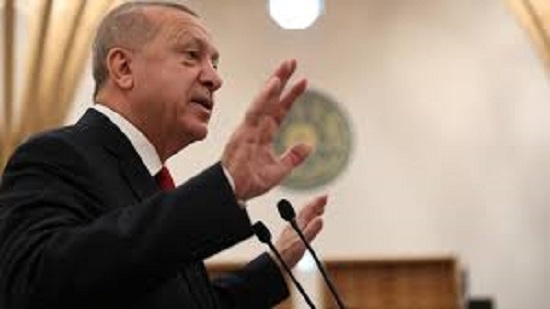Despite Turkey s attempts to gain a foothold in North Africa and the Mediterranean, the world community was taken by surprise when Turkish President Recep Tayyip Erdogan signed an agreement with the Prime Minister of the Government of National Accord in Libya, Fayez Al-Sarraj. The agreement covers security and military cooperation as well as the demarcation of maritime boundaries, immediately rejected by Egypt, Greece and Cyprus, raising tensions in the Mediterranean Sea.
Erdogan s Libya provocations
by Al Ahram
Opinion
00:12
Wednesday ,11 December 2019

Egypt, Greece and Cyprus insist that the declaration between Turkey and Sarraj s government has no legal weight, does not impact the rights of countries on the Mediterranean Sea, and that Al-Sarraj has overstepped his authority. Article 8 of the Skhirat Agreement signed by Libyan parties in 2015 defines the powers of the Libyan prime minister in Tripoli and gives the power to sign international agreements to the Presidential Council, not its chairman alone, which means Al-Sarraj s signature on this agreement is void and does not affect the rights of other countries on the Mediterranean.
The biggest question is the timing of the Turkish move, when parties are trying to find a solution to the Libyan crisis and make the Berlin political process succeed. Germany will host a broad conference on Libya before the end of the year. With extraordinary tenacity, Erdogan said he will present the agreement to the Turkish parliament soon, and that all articles will be implemented, a clear violation of international law.
Turkey began exploring for oil and gas in the Mediterranean Sea, a step the EU described as illegal. In October, Erdogan said that Turkish interference in Libya is an “inherent right” as Libya is the inheritance of his ancestors. This was strongly criticised by senior Libyan politicians including Parliament Speaker Aqila Saleh who described Erdogan s statements as “colonialist”, constituting interference in Libya s domestic affairs, and also an excuse to support terrorists and propagate “historical fallacies” in support of armed groups and militias who control Tripoli.
Analysts believe the illegal agreement allows Al-Sarraj s government to receive military and logistical support from Ankara to fight the Libyan National Army led by General Khalifa Haftar. It also affords Turkey the right to use Libyan airspace, waters and land without prior permission from Libyan authorities, and build military bases, which would be a violation of Libyan sovereignty.
Turkey s actions could trigger uncalculated regional confrontations, increase political polarisation and provide armed militias inside Libya with help from foreign parties that do not want the conflict to end, but rather wish to increase polarisation to serve Ankara s interests, opening a gateway to controlling areas teeming with anarchy. Turkey s policies in some African countries are key to understanding Turkey s recent moves.
An effective role by the global community and major world powers is key to reining in Erdogan s government, stopping its provocations of major regional countries to prevent matters from spiralling out of control.


